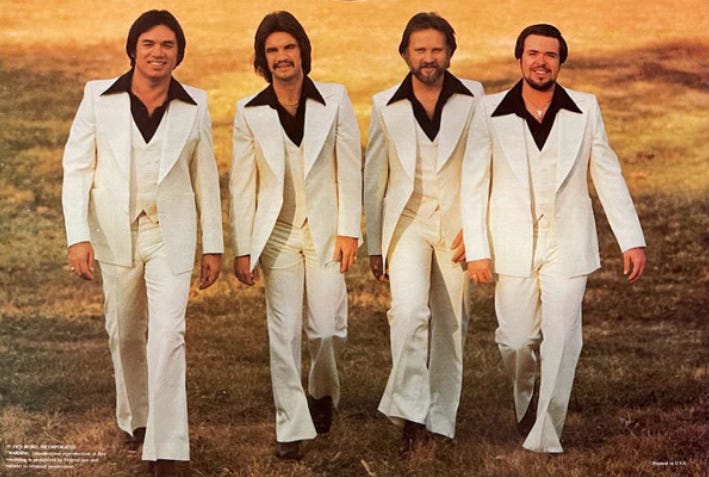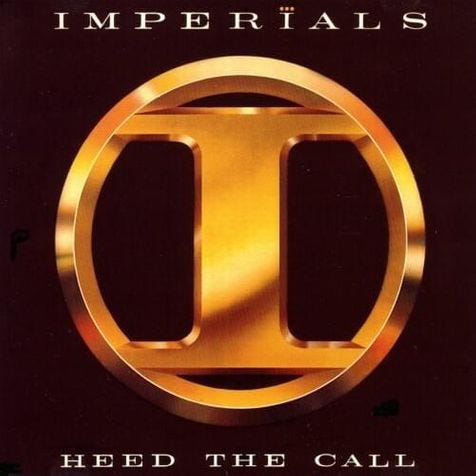Good morning!
Over the weekend at the family reunion, my sister-in-law approached me, and had some nice things to say about my Substack, which was very sweet. But then her eyes narrowed. “But I don’t get why you are doing the Imperials! I listened to six seconds of three of the songs, and I didn’t dare listen to any more in case Spotify changed my algorithm.” Other family members mostly agreed. But no one could top my husband’s criticism: “If I was snatching things from the wreckage of the culture, the last thing I would grab would be the Imperials! I would happily watch it all go down the drain, no regrets!” But then he changed his mind. “Except for Oh Buddha. That song’s great.”
So that’s my introduction to the 1979 Imperials album, Heed the Call, which not only features that fabled triple-topping song worth salvaging (hitting #1 on the lists for Southern Gospel, Contemporary Christian, and Inspirational that year) but a number of other gems. While acknowledging that my in-laws have superior taste, I will nevertheless keep digging in the rubble of past songs for the gold, because these are songs that have enriched my faith. And there are far worse things to disagree on with your in-laws.
1979 was the era of disco and this opening track delivers that vibe with bass guitar slides and snaps. As an adult, I now sneer at everything disco, from the wide leg pants to the mirrored balls, but I can’t forget that as a child, I loved it all.
This song is the first song I remember dancing in public to. I was probably about nine years old and we were at a parish potluck and someone—probably my dad—turned on this album on the speakers, and a bunch of us got up on the parish stage and started dancing—kids and teens and adults. It made the church dinner into a party, one that still warms my imagination. There were no colored lights or polyester jackets, but we spun and danced and had a great time.
“Overcomer” is not to be confused with Mandisa’s very nice 2013 song of the same name. Here’s the lyrics of the Imperials song, thick with Biblical references, sung energetically by Russ Taff with strong backgrounds from Will, Murray, and Morales:
Jesus said that when we pray
to believe that we receive:
We can have our heart's desires
as well as the things we need.
We can speak to mountains and they would be removed.
Everything will prosper that we set our hands to do.
We've got unlimited ability:
All things are possible
To them that believe—
Overcomer! (Overcomer)
Born of God (Born of God)
Joint-heirs with Jеsus Christ!
Ruling over circumstances
Fills us in this life (in this life!)
Protеcted by our shield of faith
And using the power of His name,
The battle's been won,
And we have overcome.
The emphasis is different from Mandisa’s: more detached, more Scriptural, more masculine, using Taff’s signature military imagery. As I said, I enjoyed this song as a child just for the beat, the slides and the sing of the thing, because I only understood snatches of the words. Now as an adult, I appreciate what I tend to forget: we are indeed joint-heirs with Jesus Christ and have access to whole treasuries of graces through His Church. If you don’t understand the context, here it is in Romans 8:15-17:
When we cry, “Abba! Father!” it is that very Spirit bearing witness with our spirit that we are children of God, and if children, then heirs, heirs of God and joint heirs with Christ—if, in fact, we suffer with Him so that we may also be glorified with Him.
Good words to ponder in these fearful days. Christ has indeed won the victory, and we need not be “children driven by the wind,” (Ephesians 4:14) but “strengthened in the inner man” (Ephesians 3:16) and “made complete in Him” (Colossians 2:10), as the second verse says.
The song’s final lyrics ask, in line with Romans 8:31:
If God be for us, who can stop us now
From turning this whole wide world around, overcomer?
This is a good question. I have to remind myself as a Catholic to not be defeatist, but to remember who we are in Christ: overcomers. As Our Lord says in John 16:33, “In this world you will have trouble, but be of good cheer! I have overcome the world.” I still admit that I need that reminder daily.
And I still admit to enjoying the beat, 70s disco or not.
If there is one Imperials song I have recalled and recommended to friend after friend in need through the years, this is it. Introducing the lyrics will explain why.
When you're up against a struggle
That shatters all your dreams,
And your hopes have been cruelly crushed
By Satan's manifested schemes,
And you feel the urge within you
To submit to earthly fears,
Don't let the faith you're standing in
Seem to disappear—
Praise the Lord!
He can work through those who praise Him—
Praise the Lord—
For our God inhabits praise.
My mother earnestly propounded to us time and again as we were growing up the crucial importance of pure praise in the life of a Catholic. Too often we are mired down in endless prayers of petition or repentance— we often forget the power and release that comes simply from praising God, as the Psalms do. Of being caught up in the wonder of His greatness, majesty, and power. The Gloria at every Mass should remind us, but too often the words become stale and rote, and we forget what this song earnestly says: He inhabits the praises of His people (Psalm 22:3). In other words, praising God makes Him present.
The lyrics reinforce this:
For the chains that seem to bind you
Serve only to remind you
that they drop powerless
behind you
when you praise Him.
(Just typing this out, I am kind of geeking out over that triple-syllable triple rhyme in the chorus. A masterful song.)
Russ Taff’s voice swells with anger and then with passion in the second verse:
Now Satan is a liar!
And he wants to make us think
That we are paupers
When he knows himself
We're children of the King!
So lift up the mighty shield of faith,
For the battle must be won!
We know that Jesus Christ has risen
So the work's already done!
Praise the Lord!
Take the message of this song to heart and ask yourself: if you are habitually distressed, anxious, or despairing, how long has it been since you praised God? I can certainly testify that so many times, when faced with a desperate and hopeless situation, I have taken the advice of this Pentecostal song, and lost myself in praises of God, thanking Him for His glorious work and affirming that His power and faithfulness reach to the skies. And even if the actual circumstances didn’t seem to change when I was finished, I realized I had changed. I had a restored perspective, a reminder of who I was and Who He Is. And that eventually changed everything.
The politically-incorrect song of politically-incorrect songs, this humdinger tune could never mount even one chart today, let alone the three it topped in 1979, where it remained #1 for seven months on the Southern Gospel chart. It was written by Mark Farrow, an Arkansas garbage man facing the faddish enthusiasm of his fellow men for Eastern religions like Buddhism, Hare Krishna, and Islam or cults like the Reverend Moon’s Unification Church. Farrow wrote this “simple song” in response, and Russ Taff covered it for the Imperials in easygoing country-music style with plinking piano and banjo. You can almost hear the garbage collector from the Deep South speaking:
Well, old Buddha was a man
And I'm sure that he meant well,
But I pray for his disciples
Lest they wind up in hell.
And I'm sure that old Mohammed
Thought he knew the way,
But it won't be Hare Krishna
We stand before on the Judgment Day—No, it won't be old Buddha that's sitting on the throne
And it won't be old Mohammed that's calling us home
And it won't be Hare Krishna that plays that trumpet tune,
And we're going to see the Son, not Reverend Moon.
He enters a plea which is heartfelt in its statement of the truth:
Well, I don't hate anybody,
So please don't take me wrong,
But there really is a message
In this simple song.
You see, there's only one way, Jesus
If eternal life is your goal,
And meditation of the mind—
It won't save your soul.
Mindfulness is not salvation. He then takes aim at his fellow Christians, including Pentecostals, with the same straightforward manner.
Well, you can call yourself a Baptist
And not be born again—
A Presbyterian or a Methodist
And still die in your sin—
You can even be Charismatic—
Shout and dance and jump a pew—
But if you hate your brother,
You won't be one of the chosen few.
What Catholic could disagree? And the singer goes on in the same vein:
'Cause it won't be a Baptist
That's sitting on the throne,
A Presbyterian or a Methodist
That's calling us home!
And it won't be a Charismatic
That plays that trumpet tune!
So let's all just live for Jesus
Because He's coming back real soon—
Of course, for me, living for Jesus means living in the Church He founded. In an era where Catholics are pastoral to the point of panic regarding other religions, this song still gives forth a breath of fresh air. I can’t help thinking Benedict XVI would have enjoyed it.
I recall years ago a Catholic critic taking issue with Amy Grant’s cover of this song, but I can’t recall why. Grant’s version on her first album was more confrontational, with a heavy beat and an in-your-face attitude which makes the theology more pointed. By comparison, the Imperials’ version is more thoughtful, diagnostic. The “old man” is the fallen self which dies in baptism, although our habits of sin might remain, constituting the “rubble” surrounding your Temple of the Holy Spirit.
Are you living in an old man’s rubble?
Are you listening to the father of lies?
Are you walking with unnecessary burdens?
Are you trying to take them upon yourself?
If you are, then you’re living in bondage,
and you know that’s bad for your spiritual health.
Are you trying to live by your emotions?
Are you putting your faith in what you feel and see?
Then you’re living just to satisfy your passions,
and you better be careful, ‘cause you’re being deceived.Are you living in an old man’s rubble?
Are you listening to the father of lies?
If you are, then you’re headed for trouble—
if you listen too long, you’ll eventually die.
Going back to this enjoyable song, I find it’s about discernment of spirits, of becoming aware of your fallen human flesh, what Paul calls the “old man” in 2 Corinthians 5:17. We all have sinful or broken patterns of thinking or acting that we need to beware of. The hold that the devil has on so many of us is a lie he has gotten us to believe: we’re not worthy. We’re always going to be this way. I have learned the particular smell of demons is hopelessness. If we believe the lie, the devil has a hold on us that he does not need to release until we renounce the lie and embrace the truth of God.
Are you puzzled by the way that you’re behaving?
Do you wonder why you do the things you do?
Are you puzzled by your lack of resistance?
Do you feel that something has a hold on you?
Well, deep within you is a spiritual battle:
There’s the voice of the darkness and the voice of the light.
And just by listening you’ve made a decision
’Cause the voice you hear is going to win the fight.
There may be some Protestant anthropology here but it’s so lightly shaded I can’t detect it. Thus I can’t find much to object to in this song, which represents the lived experience of so many of us, struggling with our “old selves” and fighting the spiritual battle. And the song urges us towards conversion and future glory:
…If you’re living as a new creation,
if you’re listening to the Father of light,
Then you’re living in a mighty fortress,
and you’re gonna be clothed in power and might!
Jim Murray takes the lead in the titular light-hearted song, characteristic of so much of the 70s. In the ending call-and-response, Morales takes the lead with his enjoyable bass.
When the Spirit tries to move you,
heed the call—
and when the devil tries to confuse you,
you gotta build a holy wall.Because the good Lord is watching to see
that we are listening to His Word,
and there is no one more disappointed
when we act like we haven’t heard.You gotta heed the call, brother,
Heed the call, sister!
Everybody, one and all: heed the call.
The song also contains a surprising endorsement of apostolic poverty:
And if He asks you to sell your riches,
and give away all your wealth,
I can promise you He’s got something greater
Than you or I know ourselves!
You gotta heed the call, brother…
What used to be the B side of the album in the days of vinyl is a throwback funk song that Andrus would have been proud of. Taff urges the listener:
Let Jesus do it for you, do it for you, let Him
do it for you right away.
Catholics tend to swing between Pelagianism “We do everything!” and Quietism “We do nothing!” This song reminds us of the power of the Holy Spirit to effect conversion, if we yield to him, adding details that speak to me of my earliest days of surrender to Christ:
Let Him clean up your conversation
with His words of light,
Let Him clean up your whole situation,
Let Him in your sin and strife.
He’ll fill you up with His Holy Spirit
and power from above—
Let Him write you a new life story filled with perfect peace and love…Just let Him
clean up the mess you’ve made!
Let Him pick you up and turn you round and set your feet
On solid ground.
Clean up the mess you’ve made!
Let Jesus do it for you right away!
Often we cradle Catholics, especially teens, feel that we have been saddled with a hunk of steel and rubber filled with complexities and mysteries that we are forced to haul around with us wherever we go. The turning point in our lives is when Christ stops us and says, “You know that thing you are trying to pull on your own strength? It’s a Lamborghini,” while putting a golden car key in our hands. That key is the Holy Spirit, Who if we yield to Him, will lead us to get in and drive.
This is another song that has encouraged me throughout the years. Sung by Dave Will with an acoustic and jazzy blues background, it’s right in my singing range, so I can sing along to it. Anyone who has struggled with dryness in the spiritual life might appreciate this.
When I stop and look around me,
and I see how far I’ve come,
the road ahead gets looking long,
and I’ve only just begun.A voice inside reminds
I haven't come alone—
He wouldn't bring me this far
Just to leave me on my own.
When we compare ourselves to others, or even our own ideals, it’s easy to get discouraged, especially if we are prone to scrupulosity. But we have to rest in the knowledge that Christ sees our desire for Him and will not abandon us. Indeed, sometimes He lets us struggle to build up spiritual muscle, also known as virtue.
Growing stronger,
With every step I take.
I'm learning to depend on You
And how to use my faith—
Growing stronger,
With every battle that I win.
It's plain to see
You're teaching me
Everything I need to know to be
Strong enough for anything.
I have to admit I love this second verse:
When my dreaming turns to wandering
And my feet give in to go,
It doesn't take me long to see
That there are still things I still don't know.
In Your gentle way, You teach me
How to walk with You.
Prepare me for the open door
You want to take me through.
Even though it seems that sometimes things
aren’t looking like they should,
I can stand and sing
that everything is working to the good.
Check out Romans 8:28 for the context of that last line. God does indeed work all things, even our failures, for the good of our salvation. He wants us to be with Him, and will not leave us orphans.
In a total change of pace, Murray leads this county-gospel song which works well for a hoe-down. In it, the Imperials anticipate Christ’s return and that first morning in heaven, using the familiar idioms of saints marching in and angels with harps and halos. (Nitpick: I kind of thought Jubal as a descendant of Cain might not have made it into heaven, but apparently some medieval commentators disagree, so I guess it’s ok.)
Play, my friend David,
Play upon your harp,
And let your music fill the skies!
Join in there, Jubal,
Play upon your flute,
And give the angels reason to fly!
Sing with your spirits,
Hum with your hearts,
And make that music in your soul!
Clap your hands,
Stamp your feet,
And raise your hands!
Sing on out when the trumpet starts to blow!
There'll be a great jubilation,
The longest celebration
That all of heaven's ever seen!
And I can't wait
'Til that first morning in heaven—
Over and over and over and over and over and over again!
Again, this song brings back childhood memories. Between songs like this one and Narnia, as a kid I never thought of death as anything but an adventure and looked forward to heaven as the best of all summer holidays. This song still brings a bit of that heaven-on-earth joy to me. After all, aren’t we supposed to be living our heaven now? As another medieval commentator wrote, “No heaven can come to us unless our hearts find rest in it today. Take heaven.” Those words moved me so much that I literally painted them on our stairs:
It’s worthwhile imagining that first morning in heaven, even if we don’t warm to country images of hymn singing and stamping feet. But who knows? Maybe your kids might.
All around there’s hurried confusion
The cares of life are pressing in—
All through the day,
They try to steal my faith
With words that hurt
And deeds that block my way.
Ah, but that’s when I remind myself
Whose child that I am,
And inside me there is strength to overcome,
And then I speak His name
And the tension breaks,
And His love flows as a song to my heart.
Whenever I speak His name,
I call upon His name,
And all the burdens of my heart
They roll away—
I just breathe His name,
I call upon His name,
And all the cares of this world
They roll away—
A constant theme of the Imperial’s songs is the power of Jesus’ name. His name literally means “Savior.” And He yearns to save us! At a time when Catholic membership in the Holy Name Society is at an all-time low, it is good to see Protestants preserving the power of Jesus’ name in songs like this slow jazz tune.
This was never a favorite song (I always skip over it) but as I get older, perhaps it will feel more relatable. However, it does feature a rare lead by bass singer Morales that shows off his prowess as a soloist.
My mind forgets a million things
Places, dates, and names of kings
Only one memory stays new
The day I gave my life to You.
Always returning to the day of your conversion is as important for a Christian as revisiting the days of first love is for a married couple. (And if as a Catholic, you haven’t ever explicitly surrendered your life to Christ, what are you waiting for? Your deathbed?)
He didn't bring us this far to leave us.
He didn't teach us to swim to let us drown.
He didn't build His home in us to move away.
He didn't lift us up to let us down.
The closing song of this richly tuned album returns to the theme of abiding in God, reminding us of His promises, His faithfulness, His plans for us: plans for good and not for evil, to give us a future and a hope. So upon review, I find there’s still a lot to love in this late 70s album. And who knows? Maybe eventually some of my family members will come around.
Don’t worry, I’m not holding my breath. :)








